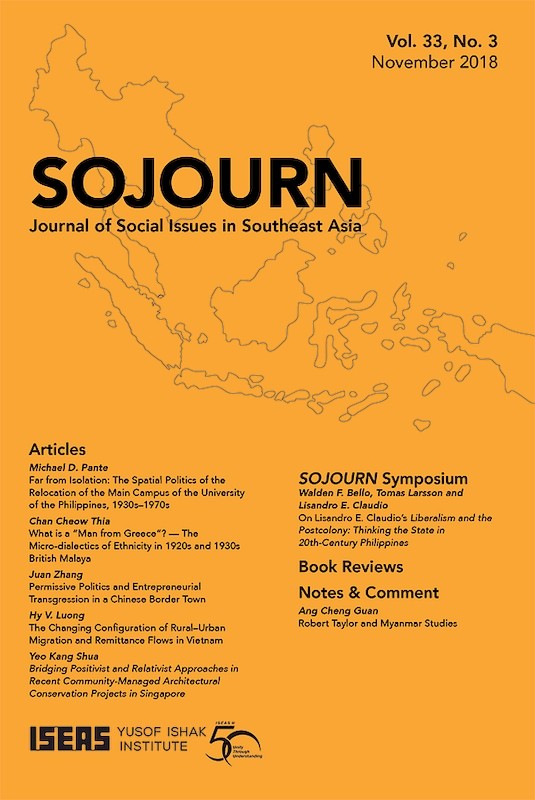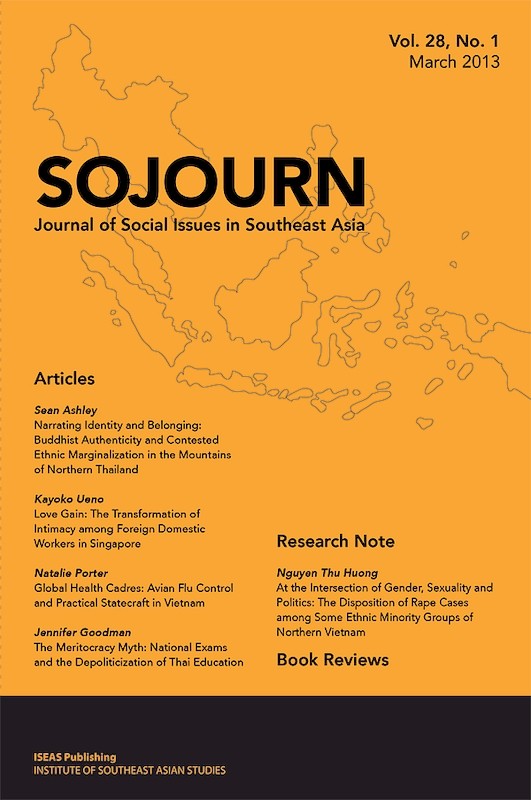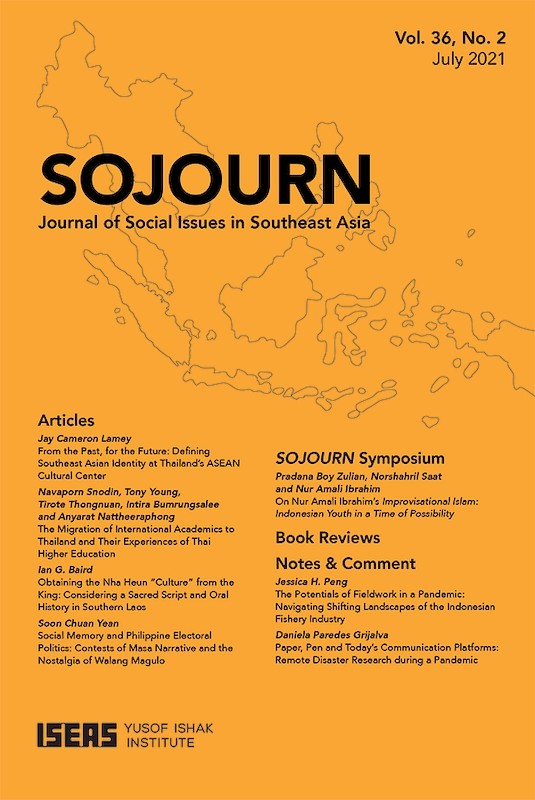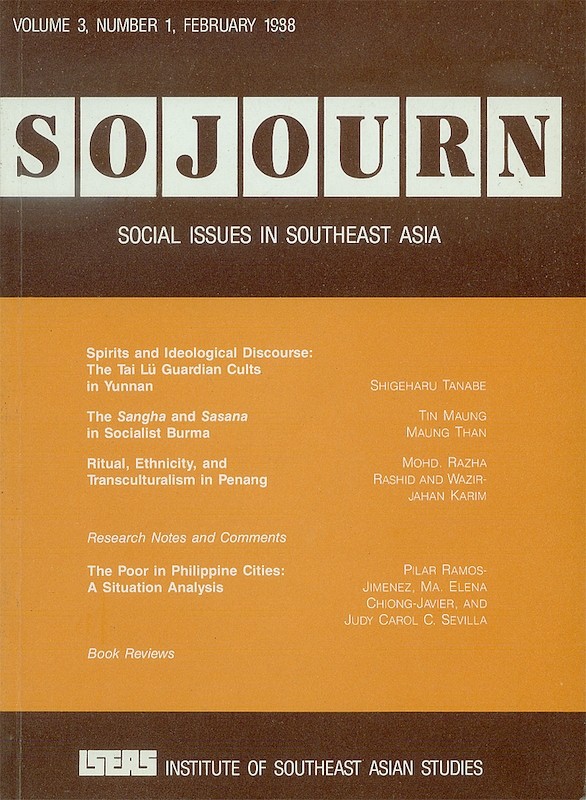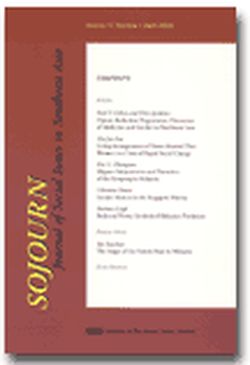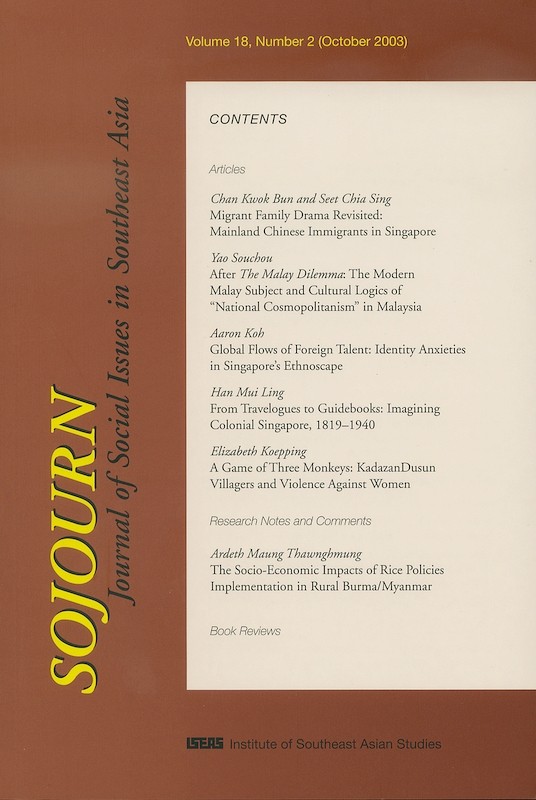SOJOURN: Journal of Social Issues in Southeast Asia Vol. 15/1 (Apr 2000)
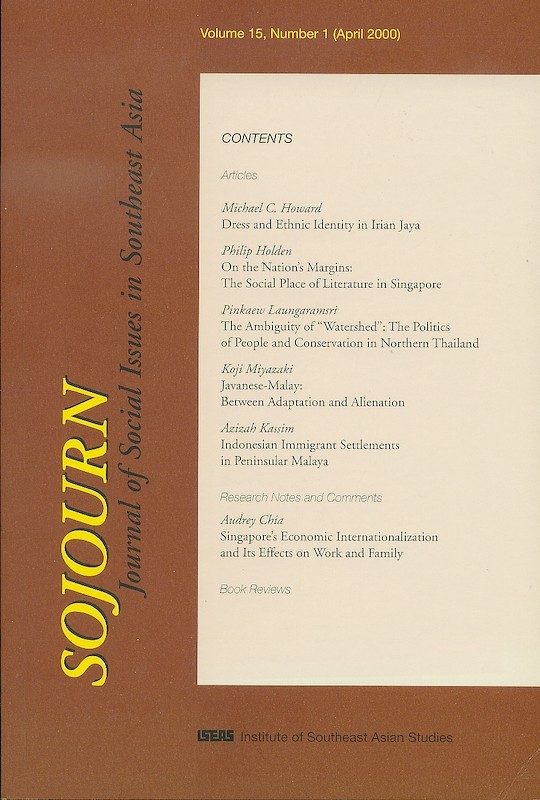
Date of publication:
April 2000
Publisher:
Institute of Southeast Asian Studies
Number of pages:
152
Code:
SJ15/1
Contents
-
Preliminary pages
-
Dress and Ethnic Identity in Irian Jaya, by Michael Howard, contributor see abstractWhile there has been a growing interest in studies of dress in Southeast Asia among academics in recent years, analysis of the relationship between dress and ethnic identity has been largely neglected. The present article examines this relationship in the Indonesian province of Irian Jaya. The article begins with a brief survey of writing on dress and ethnic identity in Southeast Asia, with a focus on Indonesia. This is followed by an overview of traditional Irianese societies and dress. The next section examines acculturative influences during the period of Dutch rule and under the early years of Indonesian rule. The final section looks at developments over the past few years in regard to acculturative pressures and the contemporary use of items of dress associated with Irianese identity.
-
On the Nation's Margins: The Social Place of Literature in Singapore, by Philip Holden, contributor see abstractDespite the fact that there is now a substantial body of Singaporean literature in English, little connection is made between literary texts and the national imaginary, and literary study in schools is taught using a syllabus with a preponderance of British texts. The roots of this paradox may be explored by examining the institution of English studies under the colonial state in the Straits Settlements, followed by developments immediately after Singapore gained self-rule in 1959. A comparison with the status of literary studies in another former British colony, Canada, reveals the extent to which post-independence curricular reform is necessary, and the extent to which such reform is helpful in exploring nationhood and modernity.
-
The Ambiguity of "Watershed": The Politics of People and Conservation in Northern Thailand, by Pinkaew Laungaramsri, contributor see abstractThe current conflict over watershed management between the lowlanders and highlanders in Chomthong has unveiled various aspects of the politics of people versus nature conservation. What is important is that the conflict has exposed the shifting and inconsistent views of the Thai state towards the peripheral areas and its people. Thus, on the one hand, the official discourse on "watershed" was appropriated by the urban middle-class conservationists and lowlanders to legitimize their control of highland resources to the exclusion of the highland minorities. The two groups also used ethnic differences to justify their control over the highland resources. On the other hand, the conflict also showed that the control by the dominant power could never be absolute. Highlanders responded to the "watershed regime" by redefining watershed integrity, adapting to the state conservation pressure, and seeking and forming alliances with other groups.
-
Javanese-Malay: Between Adaptation and Alienation, by Koji Miyazaki, contributor see abstractThis paper examines the interaction between the imposed image of "otherness" and its manipulation. Descended from migrant workers who came over in the 1920s and 1930s, the Javanese-Malays form a latent sub-category within Malay society. They are generally known as powerful sorcerers or medicine men in Malaysia. Although this is partly due to their Javanese syncretic tradition, their alleged power could also be explained in relation to their marginal position in Malay society. Pragmatically, the Javanese-Malays also took advantage of the imposed image by carving for themselves a niche in the practice of sorcery that the Malays with their stronger Islamic orientation tend to avoid, officially at least. However, in the process of becoming "Malay", the Javanese-Malays inevitably began to depart from their niche and thus their alleged magical power, which has served as their cultural resource.
-
Indonesian Immigrant Settlements in Peninsular Malaya, by Azizah Kassim, contributor see abstractFor over two decades, until the economic crisis in mid-1997, Malaysiaâs rapid economic growth attracted an influx of foreign labour, mostly from Indonesia, Bangladesh, and the Philippines. In 1997 the number of registered workers was estimated at 1.2 million and undocumented ones at approximately 800,000. The influx created various problems, of which housing is one of the most serious, especially in the Kelang Valley. This paper examines the ways and means which Indonesian workers, the largest group among the foreigners, overcame their accommodation problem. Two types of settlements are identified, that is, illegal ones in the squatter areas and legal ones, which are largely in Malay Reservation Areas. The settlements, which signify Indonesians' success in finding a foothold in Malaysia, today have become a base for more in-migration.
-
Singapore's Economic Internationalization and Its Effects on Work and Family, by Audrey Chia, contributor see abstractThere are tensions between Singaporeâs economic strategy of internationalization and the emphasis on family life. Frequent travelers, unaccompanied expatriates, and their families experience these tensions. The frequent or extended absences of frequent travelers and expatriates make it difficult for them to fulfill their family roles and obligations, and may lead to estrangement from their families. Families who are left behind may face role conflict and role strain, but actually draw closer in their efforts to cope with the absence of their absent members. Re-searchers, policy-makers, and employers can contribute towards re-ducing the tensions between internationalization and family together-ness.
- BOOK REVIEW
-
BOOK REVIEW: Whose Place Is This: Malay Rubber Producers and Thai Government Officials in Yala. By Andrew Cornish, by Michael J Montesano, contributor
-
BOOK REVIEW: Explorations in Social Theory and Philippine Ethnology. By Raul Pertierra, by Frank Hirtz, contributor
-
BOOK REVIEW: Outward Appearances: Dressing State and Society in Indonesia By Henk S Nordholt, by Fiona Kerlogue, contributor
-
BOOK REVIEW: Rituals of National Loyalty: An Anthropology of the State and the Village Scout Movement in Thailand. By Katherine A. Bowie, by Thanet Aphornsuvan, contributor

